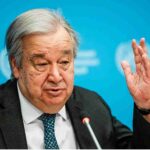
Former President Donald Trump didn’t just pick a running mate here — he poured political fuel on the Republicans’ raging fire on foreign policy.
By nominating Senator J.D. Vance, 39, one of the party’s leading national security advocates, Trump has strengthened the hand of isolationist forces eager to undo the aggressive Republican Party consensus that has endured since the Reagan era.
If Trump prevails in November, the non-interventionists will have one of their most vocal advocates on Trump’s side. What worries the hawks is that Vance may also be the last adviser in the former president’s ear.
While they toed the party line and praised Vance in their public remarks, private interventionists ranged from horrified to merely alarmed that one of the most vocal critics of Ukraine aid could soon be first in line for the presidency. The grimaces, sighs and whispered frustrations of the old guard as they made their way through the convention reception circuit were easy to find the day after the selection.
Rep. Ken Calvert (R-Calif.), who oversees military spending as chairman of the Defense Appropriations Subcommittee, told an aide, according to a person familiar with the exchange: “The Ukrainians better hurry up and win.”
Another influential Republican in Congress simply told me about Vance’s selection: “I’m scared to death.”
Though he was wearing it before Trump announced his running mate, the Ukrainian flag pin on the lapel of Sen. Roger Wicker (R-Miss.), the ranking Republican on the Armed Services Committee, illustrated vividly, without words, the gulf between much of the GOP and Vance on the war in Europe.
Vance’s selection was a significant victory for the former president’s eldest son, Donald Trump Jr., who has lobbied the Ohioan publicly and privately.
Trump’s younger allies couldn’t help but gloat in the hours after the announcement. On Monday night, Tommy Hicks, a close friend of Trump’s son and a former RNC co-chair, sent an email to Karl Rove, the former strategist for George W. Bush, who praised North Dakota Gov. Doug Burgum as a potential running mate. “Karl — you fucked up,” Hicks wrote in the note, which was forwarded to others who showed it to me the next day. “We will remember.”
With President Joe Biden still under pressure from his own party to withdraw from the race and Trump sidelined after surviving an assassination attempt, top Republicans have never felt more optimistic this year about their prospects. That confidence, along with Vance’s selection, has accelerated conversations here about who should fill Trump’s Cabinet, the kind of discussions that usually begin in the fall.
In a series of interviews, Reaganite Republicans have openly called on Trump to counter Vance’s influence by appointing more hawkish national security officials.
After praising the former Marine’s political talent and story of overcoming poverty — touting the value he brings to the campaign trail — lawmakers turned to governance.
“I would love to see more like-minded people in Cabinet positions,” Sen. Joni Ernst (R-Iowa) told me, citing former Secretary of State Mike Pompeo and Sen. Tom Cotton (R-Ark.), both hawks, as “Ernst-style” picks.
After insisting that Trump believes in “peace through strength,” Reagan’s creed, I asked Ernst if Vance does.
“He does it because Trump does it,” she retorted.
Sen. John Thune (R-S.D.), the Senate’s second-ranking Republican, extolled Vance’s talents as a political messenger and predicted his colleague would “wipe the floor” with Vice President Kamala Harris in their debate, while also moving from July to January.
“It would be good, as they think about filling out their cabinet and these key agencies and positions, to make sure that all of these voices within the Republican heritage when it comes to national security policy are heard,” Thune told me, naming the same voices as Ernst.
When I asked how fierce the internal debates between Vance, Cotton and Pompeo would be, Thune, who is running for Senate Republican leader, acknowledged that they would be “very robust,” adding that Trump would surely relish presiding over the Situation Room scrum. “He thrives on it,” he said of the former president.
Hawks are eager to install Pompeo at the Defense Department, see Cotton at the CIA or inside the White House, and are backing Sen. Bill Hagerty (R-Tenn.) or Robert O’Brien, Trump’s first-term national security adviser, as secretary of state. The fiercest showdown may be over Ric Grenell, Trump’s first-term troll-happy ambassador to Germany who is widely seen as eyeing the State Department or national security adviser job.
The loudest voice in favor of maintaining the party’s traditional stance on national security is also a talented Republican campaigner, but Senate Republican leader Mitch McConnell has little direct influence over Trump.
McConnell (R-Ky.) has been bragging in recent weeks about how his faction is on the march, citing the strong Senate majority in favor of Ukraine aid, House Speaker Mike Johnson’s aggressive stance on the issue and how every congressional Republican who supported the package emerged unscathed from primary season.
Yet he had little to say about Vance’s selection, merely raising an eyebrow when I asked him about it immediately after it became public and declining to say more. For all his dedication to the Reaganite cause, McConnell is a partisan man first and foremost and was unwilling to distract from the week’s unity.
In a private session on Tuesday with the International Republican Institute, an internationalist group founded in the Reagan era, Mr. McConnell walked attendees through history, reminding them that the party has long struggled with isolationism. He cited one of Mr. Vance’s predecessors in the Ohio Senate, Robert A. Taft, as an illustration of how powerful the currents were in the World War II era.
The rise of Dwight Eisenhower, of course, turned Republicans away from Taftism, but the party was also changed by another Midwesterner who went from isolationist to fervent internationalist: former Michigan Senator Arthur Vandenberg.
It certainly wasn’t intentional, but what an irony of history that the Trump campaign announced that the new ticket’s first stop would be this weekend in Vandenberg’s hometown of Grand Rapids.
Politicians, however, can change their minds on foreign policy, and hawks are likely to take a sobering look at comments from another of Trump’s vice presidential candidates.
“We need to prioritize our national security with our national interest in how we make these decisions, rather than pretending we can be everywhere doing everything,” Sen. Marco Rubio (R-Fla.) told me.
I asked Rubio, who ran for president in 2016 as a role model for many Reaganites, whether he still considered himself in that realist camp.
“I think the world has definitely changed, and I recognize that as I see it evolving,” he told me. “What’s happening in Europe is important, what could happen in the Pacific is even more frightening.”
As for Republicans calling for internal balance, or competition, with Vance, well, Rubio pretty much told them to keep quiet.
The advisers, he said, are there to implement Trump’s decisions and Republicans are not “voting to surround the president with a bunch of people who are there to undermine the work.”
It was a reminder of Trump’s first term, when his more traditional cabinet and staff tried to curb his isolationist instincts.
These internal battles are likely to return if Trump retakes the White House.
No less a devoted Vance supporter than Donald Trump Jr. said the Ohioan’s selection represented a victory, but not the end of the internal war.
“I don’t know if this is ever going to end, right?” Trump told me when I asked if he was ready to declare victory.
This time, however, the vice president will not be a Reaganite like Mike Pence.
With information from POLITICO
Source: https://www.ocafezinho.com/2024/07/17/morrendo-de-medo-os-falcoes-da-seguranca-do-partido-republicano-criticam-a-selecao-de-vance/

